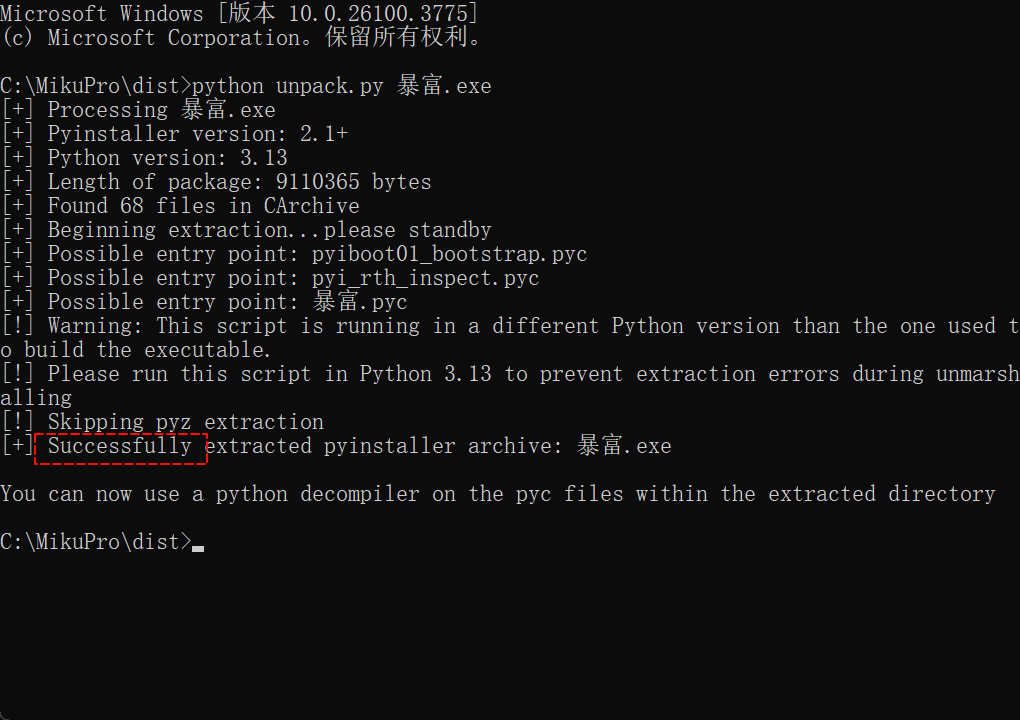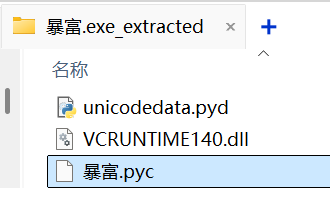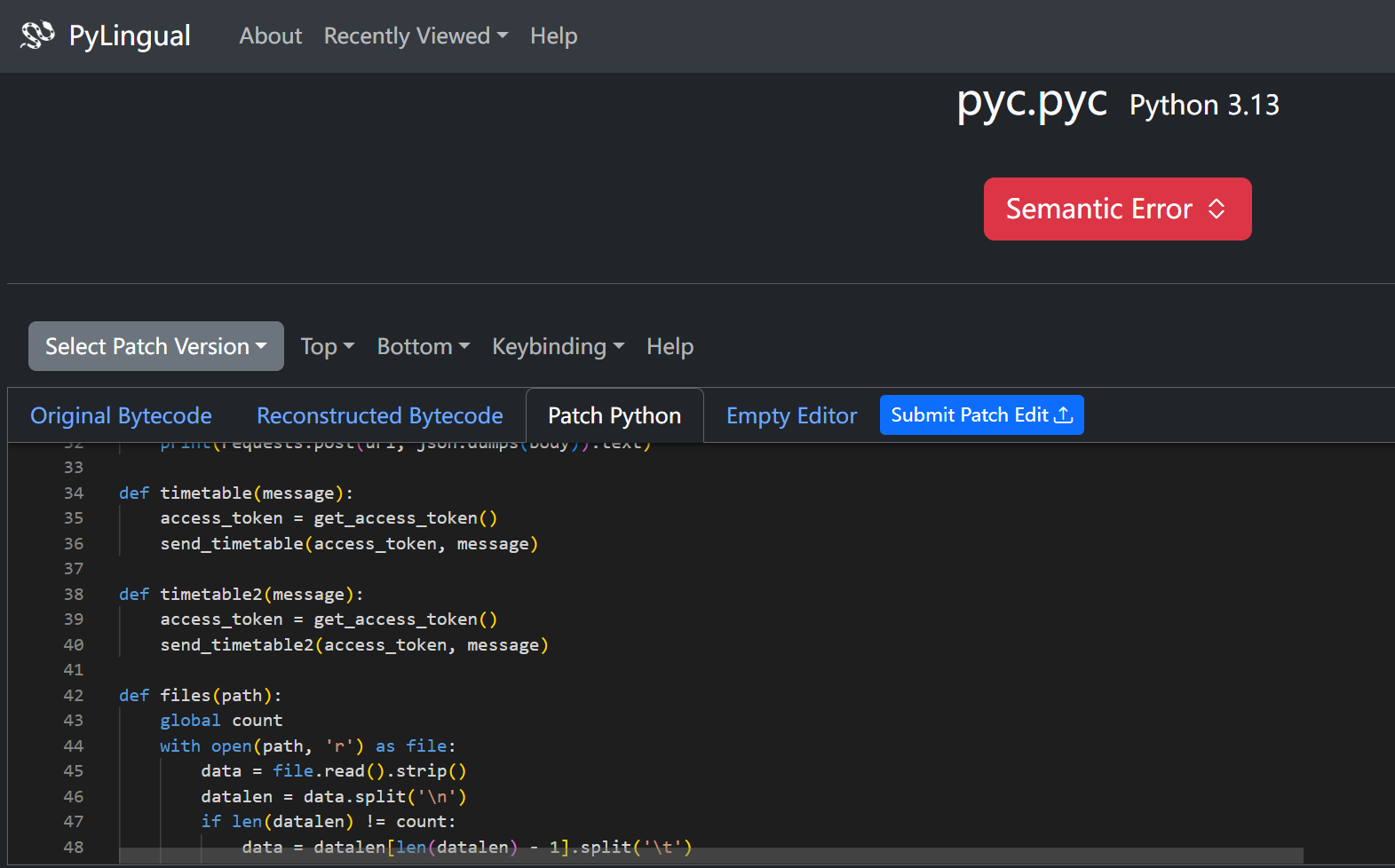文章目录
- 一、将exe文件转换成pyc文件
- 二、将pyc文件反编译成py代码
一、将exe文件转换成pyc文件
- 新建一个
unpack.py文件,将以下代码复制粘贴进去
from __future__ import print_functionimport osimport structimport marshalimport zlibimport sysfrom uuid import uuid4 as uniquenameclass CTOCEntry: def __init__(self, position, cmprsdDataSize, uncmprsdDataSize, cmprsFlag, typeCmprsData, name): self.position = position self.cmprsdDataSize = cmprsdDataSize self.uncmprsdDataSize = uncmprsdDataSize self.cmprsFlag = cmprsFlag self.typeCmprsData = typeCmprsData self.name = nameclass PyInstArchive: PYINST20_COOKIE_SIZE = 24 PYINST21_COOKIE_SIZE = 24 + 64 MAGIC = b\'MEI\\014\\013\\012\\013\\016\' def __init__(self, path): self.filePath = path self.pycMagic = b\'\\0\' * 4 self.barePycList = [] def open(self): try: self.fPtr = open(self.filePath, \'rb\') self.fileSize = os.stat(self.filePath).st_size except: print(\'[!] Error: Could not open {0}\'.format(self.filePath)) return False return True def close(self): try: self.fPtr.close() except: pass def checkFile(self): print(\'[+] Processing {0}\'.format(self.filePath)) searchChunkSize = 8192 endPos = self.fileSize self.cookiePos = -1 if endPos < len(self.MAGIC): print(\'[!] Error : File is too short or truncated\') return False while True: startPos = endPos - searchChunkSize if endPos >= searchChunkSize else 0 chunkSize = endPos - startPos if chunkSize < len(self.MAGIC): break self.fPtr.seek(startPos, os.SEEK_SET) data = self.fPtr.read(chunkSize) offs = data.rfind(self.MAGIC) if offs != -1: self.cookiePos = startPos + offs break endPos = startPos + len(self.MAGIC) - 1 if startPos == 0: break if self.cookiePos == -1: print(\'[!] Error : Missing cookie, unsupported pyinstaller version or not a pyinstaller archive\') return False self.fPtr.seek(self.cookiePos + self.PYINST20_COOKIE_SIZE, os.SEEK_SET) if b\'python\' in self.fPtr.read(64).lower(): print(\'[+] Pyinstaller version: 2.1+\') self.pyinstVer = 21 else: self.pyinstVer = 20 print(\'[+] Pyinstaller version: 2.0\') return True def getCArchiveInfo(self): try: if self.pyinstVer == 20: self.fPtr.seek(self.cookiePos, os.SEEK_SET) (magic, lengthofPackage, toc, tocLen, pyver) = \\ struct.unpack(\'!8siiii\', self.fPtr.read(self.PYINST20_COOKIE_SIZE)) elif self.pyinstVer == 21: self.fPtr.seek(self.cookiePos, os.SEEK_SET) (magic, lengthofPackage, toc, tocLen, pyver, pylibname) = \\ struct.unpack(\'!8sIIii64s\', self.fPtr.read(self.PYINST21_COOKIE_SIZE)) except: print(\'[!] Error : The file is not a pyinstaller archive\') return False self.pymaj, self.pymin = (pyver//100, pyver%100) if pyver >= 100 else (pyver//10, pyver%10) print(\'[+] Python version: {0}.{1}\'.format(self.pymaj, self.pymin)) tailBytes = self.fileSize - self.cookiePos - (self.PYINST20_COOKIE_SIZE if self.pyinstVer == 20 else self.PYINST21_COOKIE_SIZE) self.overlaySize = lengthofPackage + tailBytes self.overlayPos = self.fileSize - self.overlaySize self.tableOfContentsPos = self.overlayPos + toc self.tableOfContentsSize = tocLen print(\'[+] Length of package: {0} bytes\'.format(lengthofPackage)) return True def parseTOC(self): self.fPtr.seek(self.tableOfContentsPos, os.SEEK_SET) self.tocList = [] parsedLen = 0 while parsedLen < self.tableOfContentsSize: (entrySize, ) = struct.unpack(\'!i\', self.fPtr.read(4)) nameLen = struct.calcsize(\'!iIIIBc\') (entryPos, cmprsdDataSize, uncmprsdDataSize, cmprsFlag, typeCmprsData, name) = \\ struct.unpack( \\ \'!IIIBc{0}s\'.format(entrySize - nameLen), \\ self.fPtr.read(entrySize - 4)) try: name = name.decode(\"utf-8\").rstrip(\"\\0\") except UnicodeDecodeError: newName = str(uniquename()) print(\'[!] Warning: File name {0} contains invalid bytes. Using random name {1}\'.format(name, newName)) name = newName if name.startswith(\"/\"): name = name.lstrip(\"/\") if len(name) == 0: name = str(uniquename()) print(\'[!] Warning: Found an unamed file in CArchive. Using random name {0}\'.format(name)) self.tocList.append( \\ CTOCEntry(\\ self.overlayPos + entryPos, \\ cmprsdDataSize, \\ uncmprsdDataSize, \\ cmprsFlag, \\ typeCmprsData, \\ name \\ )) parsedLen += entrySize print(\'[+] Found {0} files in CArchive\'.format(len(self.tocList))) def _writeRawData(self, filepath, data): nm = filepath.replace(\'\\\\\', os.path.sep).replace(\'/\', os.path.sep).replace(\'..\', \'__\') nmDir = os.path.dirname(nm) if nmDir != \'\' and not os.path.exists(nmDir): os.makedirs(nmDir) with open(nm, \'wb\') as f: f.write(data) def extractFiles(self): print(\'[+] Beginning extraction...please standby\') extractionDir = os.path.join(os.getcwd(), os.path.basename(self.filePath) + \'_extracted\') if not os.path.exists(extractionDir): os.mkdir(extractionDir) os.chdir(extractionDir) for entry in self.tocList: self.fPtr.seek(entry.position, os.SEEK_SET) data = self.fPtr.read(entry.cmprsdDataSize) if entry.cmprsFlag == 1: try: data = zlib.decompress(data) except zlib.error: print(\'[!] Error : Failed to decompress {0}\'.format(entry.name)) continue assert len(data) == entry.uncmprsdDataSize if entry.typeCmprsData == b\'d\' or entry.typeCmprsData == b\'o\': continue basePath = os.path.dirname(entry.name) if basePath != \'\': if not os.path.exists(basePath): os.makedirs(basePath) if entry.typeCmprsData == b\'s\': print(\'[+] Possible entry point: {0}.pyc\'.format(entry.name)) if self.pycMagic == b\'\\0\' * 4: self.barePycList.append(entry.name + \'.pyc\') self._writePyc(entry.name + \'.pyc\', data) elif entry.typeCmprsData == b\'M\' or entry.typeCmprsData == b\'m\': if data[2:4] == b\'\\r\\n\': if self.pycMagic == b\'\\0\' * 4: self.pycMagic = data[0:4] self._writeRawData(entry.name + \'.pyc\', data) else: if self.pycMagic == b\'\\0\' * 4: self.barePycList.append(entry.name + \'.pyc\') self._writePyc(entry.name + \'.pyc\', data) else: self._writeRawData(entry.name, data) if entry.typeCmprsData == b\'z\' or entry.typeCmprsData == b\'Z\': self._extractPyz(entry.name) self._fixBarePycs() def _fixBarePycs(self): for pycFile in self.barePycList: with open(pycFile, \'r+b\') as pycFile: pycFile.write(self.pycMagic) def _writePyc(self, filename, data): with open(filename, \'wb\') as pycFile: pycFile.write(self.pycMagic) if self.pymaj >= 3 and self.pymin >= 7: pycFile.write(b\'\\0\' * 4) pycFile.write(b\'\\0\' * 8) else: pycFile.write(b\'\\0\' * 4) if self.pymaj >= 3 and self.pymin >= 3: pycFile.write(b\'\\0\' * 4) pycFile.write(data) def _extractPyz(self, name): dirName = name + \'_extracted\' if not os.path.exists(dirName): os.mkdir(dirName) with open(name, \'rb\') as f: pyzMagic = f.read(4) assert pyzMagic == b\'PYZ\\0\' pyzPycMagic = f.read(4) if self.pycMagic == b\'\\0\' * 4: self.pycMagic = pyzPycMagic elif self.pycMagic != pyzPycMagic: self.pycMagic = pyzPycMagic print(\'[!] Warning: pyc magic of files inside PYZ archive are different from those in CArchive\') if self.pymaj != sys.version_info.major or self.pymin != sys.version_info.minor: print(\'[!] Warning: This script is running in a different Python version than the one used to build the executable.\') print(\'[!] Please run this script in Python {0}.{1} to prevent extraction errors during unmarshalling\'.format(self.pymaj, self.pymin)) print(\'[!] Skipping pyz extraction\') return (tocPosition, ) = struct.unpack(\'!i\', f.read(4)) f.seek(tocPosition, os.SEEK_SET) try: toc = marshal.load(f) except: print(\'[!] Unmarshalling FAILED. Cannot extract {0}. Extracting remaining files.\'.format(name)) return print(\'[+] Found {0} files in PYZ archive\'.format(len(toc))) if type(toc) == list: toc = dict(toc) for key in toc.keys(): (ispkg, pos, length) = toc[key] f.seek(pos, os.SEEK_SET) fileName = key try: fileName = fileName.decode(\'utf-8\') except: pass fileName = fileName.replace(\'..\', \'__\').replace(\'.\', os.path.sep) if ispkg == 1: filePath = os.path.join(dirName, fileName, \'__init__.pyc\') else: filePath = os.path.join(dirName, fileName + \'.pyc\') fileDir = os.path.dirname(filePath) if not os.path.exists(fileDir): os.makedirs(fileDir) try: data = f.read(length) data = zlib.decompress(data) except: print(\'[!] Error: Failed to decompress {0}, probably encrypted. Extracting as is.\'.format(filePath)) open(filePath + \'.encrypted\', \'wb\').write(data) else: self._writePyc(filePath, data)def main(): if len(sys.argv) < 2: print(\'[+] Usage: pyinstxtractor.py \') else: arch = PyInstArchive(sys.argv[1]) if arch.open(): if arch.checkFile(): if arch.getCArchiveInfo(): arch.parseTOC() arch.extractFiles() arch.close() print(\'[+] Successfully extracted pyinstaller archive: {0}\'.format(sys.argv[1])) print(\'\') print(\'You can now use a python decompiler on the pyc files within the extracted directory\') return arch.close()if __name__ == \'__main__\': main()
- 将
暴富.exe跟unpack.py放在同一个目录中,cmd执行如下命令:等待出现Successfully
python unpack.py 暴富.exe

- 在同目录下生成的
暴富.exe_extracted文件夹里找到暴富.pyc

二、将pyc文件反编译成py代码
- 将
暴富.pyc拖入PyLingual反编译器进行反编译,如果打不开网址就使用魔法

经测试,PyLingual能够正确反编译3.13及以下所有版本的pyc🐂🍺





